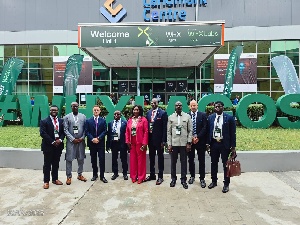Business News of Thursday, 5 June 2025
Source: www.ghanawebbers.com
Governor’s pledge : Lending rates below 10 % before 2028
Every factory, warehouse, or innovation contributes to Ghana's economy.
Ghanaian industries face many challenges. These include regulatory complexities and competition from imports. Inadequate skills in financial management and marketing also hinder growth. However, limited access to finance is the biggest constraint.
The Governor expressed concern about high interest rates affecting business growth. At a recent meeting, the central bank kept monetary policy at 28 percent. This decision aims to support disinflation gains achieved recently.
Inflation has been declining for four months straight. It dropped from 23.8 percent in December 2024 to 21.2 percent in April 2025. Despite this decline, high interest rates still hurt industries' access to working capital.
Dr. Asiama defended the central bank's cautious approach. He stated that this discipline will help industry thrive in the future. The goal is a low-inflation and low-interest environment that rewards productivity.
He aims to reduce lending rates below 10 percent during his term. The central bank is committed to improving access to finance in Ghana.
Dr. Asiama highlighted the importance of the AGI Corporate Forum. He emphasized creating a supportive macroeconomic environment for businesses to grow.
He proposed structured engagement between the Bank of Ghana and AGI. This includes quarterly forums on industrial credit access and FX policy.
Dr. Asiama noted that trust in the economy is vital for growth. As conditions improve, there will be more private sector-led expansion.
Ghana’s GDP grew by 5.7 percent last year, driven by services and industry sectors. The country recorded a trade surplus of US$4.1 billion in early 2025 due to gold and cobalt exports.
Ghana's gross international reserves are at US$10.7 billion, covering about 4.7 months of imports.
The cedi has appreciated by 24 percent against the dollar this year, reversing last year's sharp depreciation.
However, the Governor clarified that there is no target value for the cedi as it appreciates against the dollar.
He explained that they monitor core movements between the cedi and inflation rates closely.
Amid concerns about temporary economic stability due to debt relief efforts, he assured businesses that plans are underway for debt servicing.
The Governor mentioned having a profile of major payments due over the next two years.
To ensure stability, he emphasized blocking foreign exchange reserve leakages through Goldbod and tracking remittances effectively.
He dismissed rumors about artificially stimulating the cedi's value.
“Our goal is not managing exchange rates but fostering market stability,” he said confidently about their policies leading to current gains.
“The stabilization we see today is real but fragile,” he concluded, stressing its importance for sustained growth.











